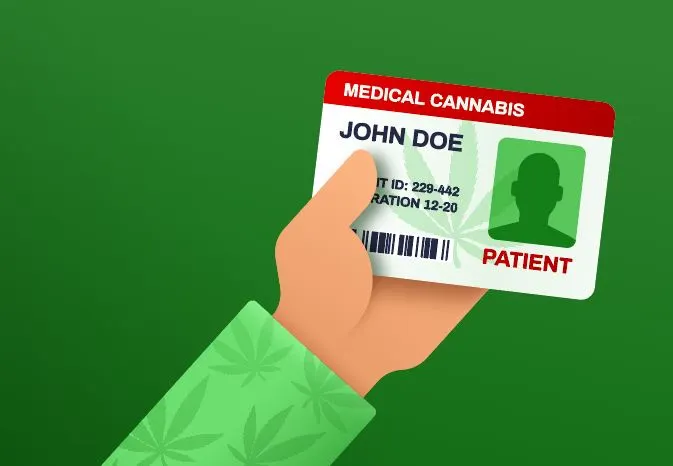
What to Do Before Applying for a Medical Card
Make sure you qualify for a Medical Marijuana Card before applying. Each medical marijuana program has a list of approved conditions (except for Oklahoma, Maine, New York, Virginia, Washington, D.C., and Oklahoma). Our doctors will decide if you qualify based on this list. During your appointment, one of our doctors will ask about your symptoms and condition.
When you book your appointment, the doctor may ask for your medical records. This helps us give the best advice. You’ll need to provide your medical records when making your appointment. This way, our doctors can make the best decision about your care. In most states, you don’t have to submit your medical records, but in some, it is required. Your records may include:
- Notes from your doctor
- A summary of your health
- A list of medications
Upload these documents to our HIPAA-compliant platform before your appointment. To make the process easier and faster, gather your information before starting. We keep all your medical records private and never share them with third parties.
Understanding Your State’s Laws
Every state has its own laws about medical marijuana use and possession.
Here are some common rules most states follow:
- Limits are set on how much marijuana you can buy or have (usually monthly).
- You cannot use medical marijuana in public places like government buildings, schools, restaurants, or public transport.
- States that allow growing at home require plants to be hidden and locked up.
- It is illegal to drive or use heavy machines while under the influence.
Medical card holders cannot own guns. - Federal workers are not allowed to use medical marijuana, even in legal states (this could change).
This list is not complete. Be sure to check your state’s laws as they may change.
Find Out If You Qualify for a Disability
Most states require you to see a licensed doctor to confirm that you have a qualifying condition. These can be physical (like cancer or epilepsy) or mental (like anxiety or depression).
Each state has a different list, but here are some of the most common conditions:
- ALS (Lou Gehrig’s Disease)
- Anxiety and depression
- Autism
- Cachexia (some states include Anorexia or Bulimia)
- Cancer and side effects from chemotherapy
- Chronic pain
- Glaucoma
- Hepatitis C
- HIV/AIDS
- Inflammatory Bowel Diseases (Crohn’s Disease, Ulcerative Colitis)
- Neurodegenerative Diseases (Alzheimer’s, Multiple Sclerosis, Huntington’s, Parkinson’s)
- Muscle spasms (especially from Multiple Sclerosis)
- PTSD
- Seizures
- Severe nausea
- Spinal cord diseases or injuries
Most states allow terminally ill patients to get a medical marijuana card as part of palliative care. Some states only allow this if life expectancy is under 6 months or a year.
Check your state’s page to see what conditions qualify where you live.
How to Apply for a Medical Marijuana Card
Follow these steps to get your medical marijuana card:
Find a Doctor in Your State
In many states, you can do this online through telehealth platforms like Dr. Phil Good. You don’t have to travel. It’s quick, easy, and HIPAA-compliant.
Fill Out the Application
Use your computer, tablet, or phone to fill out the form. Then wait in our virtual lobby until a doctor is ready. Usually, the wait is short. You can also book a time and the doctor will call you then.
Talk With Your Doctor
The doctor will ask about your medical history and why you want to use medical marijuana. You can ask questions too.
Earn Your Certification
You’ll get an email once you’re approved. In some states, your certificate is sent right after your appointment. In others, it comes once your info is entered into the system. Some states mail a paper copy. Your approval email will explain your next steps.
Apply to Your State’s Medical Marijuana Program
Most states require you to register with their program. If you got your certificate by email, download the PDF and upload it when applying. In some states, your doctor sends the certificate for you. Our guides will help you through the whole process.
Get Your Medical Card
Once approved, you’ll get your card. Some states send a plastic card, others use a digital version. You’ll use this card to buy medical marijuana from dispensaries. Some states update their systems to offer digital cards only.
The process may seem confusing, but our team at Dr. Phil Good is here to help. We know each state’s program and will guide you every step of the way.
Costs
There are a few costs to get a medical marijuana card. Not all apply to every state or person:
- Fee to see the doctor
- Fee to the state for the card
- Renewal fees for your card and certificate
- Caregiver license fee (if needed)
Where to Buy Medical Marijuana
You must first get certified by a doctor. This can be done on our HIPAA-compliant platform. Our fees depend on the state. You’ll either be approved or get your money back.
Each state runs its own program and sets its own prices and renewal timelines. Some cards last 3 years (like in Illinois), while others only last 90 days (like in Utah). Renewal frequency affects your total cost.
Benefits
Even in states where marijuana is legal for adults, having a medical card offers extra benefits. These include tax savings, special deals at dispensaries, higher purchase limits, and access to more products.
Contact Us Today!
How to Get a Medical Marijuana Card? At Dr. Phil Good, we make it easy to get your medical marijuana card with a hassle-free evaluation. Book your appointment today and start experiencing the benefits of medical cannabis. Visit us now to get started on your journey to relief! Contact now!

